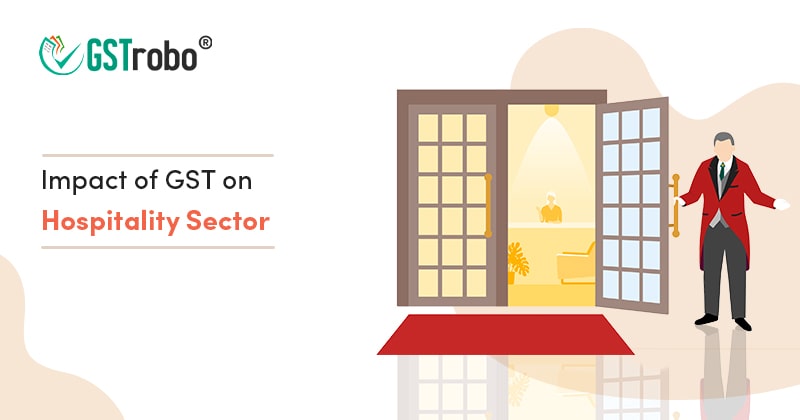Impact of GST on Hospitality Sector
In the past, the indirect tax system was in effect, and the Indian hospitality sector was subject to various indirect tax rates, such as VAT, luxury tax, and service tax. With the introduction of the GST regime and GST-related taxation, hospitality businesses in the Indian hospitality industry are set to benefit from uniform and standard tax rates across the country.
Additionally, the industry will reap the benefits of greater utilization of the Input Tax Credit. It is anticipated that GST will lower costs for customers, which will help align taxes and aid in reducing the cost of business. Indian economic growth is going through the rapid urbanization phase, as well as a growing awareness of western lifestyles and the increasing role of women.

Goods and Services Tax (GST) has significantly impacted the hospitality industry, whether you operate small guesthouses or a massive luxurious hotel. When we talk about the Hospitality Industry today, many services are added to this list of the services offered to the Hotel Industry before.
Hospitality sector before GST
The pre-GST era saw the Hotel industry pay indirect taxes on GST on room rates below 2500 INR to states and central governments. The hotel industry had to pay five different taxes – Service Tax, Excise duty, Value added tax (VAT), ITC credit, and Luxury Tax.
Of course, GST compliance was a costly and cumbersome affair. There were separate compliance periods for hotels, restaurants, bars, canteens, etc. Plus, there were multiple taxes to comply with, each with its compliance date and measures to keep pace. In addition, ITC credits were not available because states and central governments could not be set off from one another. Hence, the taxpayer got more tax on taxes than they did on the actual GST on hotel accommodation.
GST sector influence on the hospitality sector
With the implementation of the Goods and Services Tax (GST), it is expected that the hospitality sector will see an increase in revenue collection. The hospitality sector is also expected to impact employment generation positively.
In the past, the indirect taxation system was in effect, where the Indian hospitality sector was subjected to various indirect tax rates such as VAT, luxury taxes, and service tax. Under the new GST regime, all goods and services are taxed at one rate. Therefore, the entire hospitality sector is subject to the same tax rate.
This is because the Government will get more money from the hospitality industry. As a result, the Government can spend more on education, healthcare, roads, and other infrastructure projects.
Understanding GST and the Hospitality sector
It is essential to know what GST is all about. The Goods and Services Tax Act, 2017 defines GST as “a comprehensive legislation that replaces the existing complex set of laws governing the supply of goods and services.”
GST is an indirect tax levied by the Central Government on the supply of goods and services. The rate of GST varies according to the type of good or service supplied. For example, if you buy a car, your purchase price would include both the excise duty and GST. However, only the GST portion of the sale price would be charged when you sell the same car.
Talking about the Hospitality sector, it is evident that GST applies to every aspect of the hospitality industry. GST’s effect on the hospitality industry is positive overall because of the lower cost of end-users, and the business is likely to attract more tourists and customers. Furthermore, the system is expected to boost government revenue. The long-term impact of the regime will be positive, while the tax system will be reduced for customers who do not end customers and hotels.
Benefits of GST on the hospitality sector
As per the current scenario, the overall impact of GST on the hospitality sector is positive. However, some challenges the hospitality sector faces include a lack of clarity regarding implementing GST, the absence of an integrated e-way bill, and a lack of transparency in filing returns.
- By removing multiple taxes, and the cascading effect on taxation, taxation can be reduced and simplified. The final customers won’t be required to pay numerous taxes on beverages, food, and hotel charges.
- Tax processing and calculation have been made simpler and quicker for the hospitality industry.
- Taxation was previously complicated for consumers, and they couldn’t identify the tax structure correctly. With the unified tax system, it’s simple for the end-users to check and comprehend the tax structure.
- The hospitality industry can avail of the advantages of tax on input credit. Hotels may lower the tax they already pay on inputs while also paying output tax.
Conclusion
In conclusion, the introduction of Goods and Services Tax (GST) has significantly impacted the hospitality industry. While most hotels have been able to absorb the new tax structure, others have seen their profits drop significantly. However, many hoteliers say GST will ultimately benefit consumers because it will lower prices. Overall, the new tax system should help consumers and hoteliers alike. To make the GST process lighter, GSTrobo, a brand-new age GST Suvidha Provider GSP selected by the (GSTN) to offers an online platform that meets all of the regulations required by the GST law, enabling you to perform GST compliances efficiently.
